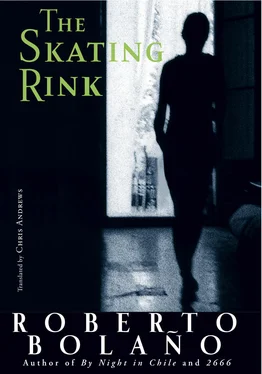Gaspar Heredia:
I watched Carmen and the Rookie from a distance
I watched Carmen and the Rookie from a distance: they were on the beach, gesturing wildly, lunging at each other and dodging; their feints were more like a hieroglyphic script than acts of aggression. Meanwhile, the swimmers, ignoring their quarrel, were heading back to their hotels, leaving them alone, enveloped in a veil of spray. Then, suddenly, Carmen left the beach and set off along the Paseo. The Rookie turned around, and after a moment of hesitation, sat down on the sand. From where I was, he looked like a dark mossy rock that had turned up on the beach the night before. I didn’t stop for long. Two hundred yards ahead of me, I could hear Carmen’s voice (it was impossible to see her in the thick mass of tourists) singing, “I am a shepherdess in Arcadia.” Mistakenly, I thought she had stopped and that if I kept walking, I was bound to catch up with her. For a long time, guided only by her song, I followed Carmen along the Paseo Marítimo, until I reached the Esplanade. Gradually I slowed my pace to match hers, the leisurely pace of a queen returning to her castle. Now she was singing, “I am a wounded thrush at the gates of Hell,” and in the faces of the people coming the other way, in some of those faces at least, I could see little sneers or empty smiles, flickers that bore unequivocal witness to Carmen’s passage and her terrifying energy. I won’t go into the details of how I shadowed her. It was more or less like the first time I followed Caridad. The streets were different and the pace was slower, but the destination was the same: the old mansion on the outskirts of Z. Carmen, as I noticed when we left town and set off on the highway that runs alongside the sea, was drunk. She would stop every ten paces and pull a bottle from her bag, then, a moment later, after taking a swig or two, resume her increasingly erratic and unsteady journey. I could hear her voice in snatches, carried by the evening breeze curling around the rocks, emphatically intoning, “I am a bell in the snow, tudum, tudum” almost as if it was a hymn. Just before reaching the mansion, I let her get ahead and stopped to think. What was I doing there? Did I really want to find Caridad, whatever the consequences might be? And if I did find her, what would I say? Would I have the courage to explain what I felt for her? I stayed there thinking for a good while, as cars sped recklessly around the bend in the highway, heading for Z or Y. Finally I got up and walked down the private road, still confused about what I wanted and what I felt. Curiosity was drawing me on, the desire to see the skating rink again, and the vague sense that I had to protect Caridad and the singer. As soon as I crossed the threshold of the mansion, the sound of the “Fire Dance” put an end to my ruminations. From then on it was like I was drugged. From then on the world was entirely transformed, and my fears and suspicions shrank away, obliterated by the brilliant alliance of desire and risk within those sturdy old walls. The fat guy was standing beside the rink, holding a notebook and a fountain pen. The arrangement of the packing cases had changed significantly since my last visit, so to get a good view of the whole rink without being seen I had to creep along the wall toward the generator. You’re losing energy, said the fat guy, barely moving his lips. The skater appeared like a breath of air from a corner of the rink beyond my field of vision and disappeared again immediately. There was something about their imperturbable presence in that abandoned mansion that reminded me of Carmen and the Rookie arguing on the beach. Did you hear me? said the fat guy. You’re losing energy. The skater stopped on the edge of the rink, next to him, and without moving, or rather moving only her hips and her pelvis, performed a little dance that clearly had nothing to do with Manuel de Falla’s music. The fat guy’s lips relaxed beatifically. After this brief interlude, the skater bent down and resumed her exercises without saying a word. The fat guy turned his attention back to his notebook: Well, well, he said after a while. Do you know how much the folk dancing is going to cost this year? No, and I don’t care, shouted the skater. The fat guy moved his head several times, nodding and shaking, and in between the nods and shakes he pursed his lips as if he was about to whistle or kiss someone on the cheek. I don’t know, there was something about the guy that made him likeable. The rectangular rink seemed to be more brightly illuminated than last time and the humming of the generator, or generators, was louder, as if the machine was signaling that it had reached its maximum capacity. What a stupid waste of money, murmured the fat guy. The girl threw him a sidelong glance as she went past, then looked up at the beams from which the spotlights were hanging, and closed her eyes. Skating blind, she slowed down gradually, but also began to move in a more complex and confident way. Each turn and shift of position had clearly been practiced many times over. Finally she headed for the center of the rink, where she leaped up and span around several times before landing precisely and skating away. Bravo, whispered the fat guy. All I know about skating is what I learned from watching some Holiday on Ice show in a bar, but what she was doing seemed perfect to me. The skater continued with her eyes closed and tried to repeat the last manoeuvre. But what should have been a stylized T figure, her body outstretched horizontally, balanced on one vertical leg, as she sliced the rink into two equal halves, became a tumble of legs and arms that finished with her lying face up on the ice. Just then, at the opposite end of the rink, I saw Caridad’s silhouette, hidden among the cases, like me. Have you hurt yourself? asked the fat guy, who started to walk onto the ice but then stopped. No, said the girl without trying to get up, her arms outstretched, her legs slightly apart and her hair spread like a cushion between her head and the ice. From the look on her face she didn’t seem to be in pain or even upset about messing up the routine. But my attention was divided between the skater and the silhouette at the other end of the rink, which, to my horror, for a moment resembled the shadow of a huge, emaciated rat. Why don’t you get up? Are you OK? Standing on tiptoe at the edge of the rink, the fat guy was clearly alarmed in the extreme. I’m fine, really, you shouldn’t talk so much, it breaks my concentration, said the skater flat out on the ice. Talk? I hardly said a thing, replied the fat guy. What about those papers you were reading aloud? That’s for my work, Nuria, don’t be so touchy, he whined, anyway, I wasn’t reading them out loud. Yes you were. A few comments, maybe, that was all, come on Nuria, get up, you could damage your back lying there, said the fat guy. Why? Because it’s very cold! Come here, help me up, said the skater. What? The fat guy put on an apologetic smile. The girl kept lying there quietly, waiting. Do you want me to help you? Don’t you feel well? Have you hurt yourself, Nuria? The fat guy’s body teetered precariously on the edge of the rink. There was something pendulum-like about him. Something uncannily reminiscent of a clockwork mechanism. Down at the other end, Caridad’s whole head was visible over the cases. Come and lie down beside me, it’s not that cold, said the skater. What do you mean not that cold? I swear, said the skater. The fat guy turned around. Caridad’s head disappeared immediately. Had they seen her? Come on, stop playing around and get on with your training, said the fat guy after scrutinizing the darkness. The skater didn’t answer. The spiky hair of the girl with the knife appeared again over the tops of the boxes. I figured the fat guy probably hadn’t seen her, although from the way he had turned around, he was definitely expecting to find something behind him. Come here, said the skater, don’t be afraid. You come here, replied the fat guy, in a barely audible voice. Still looking up at the roof, the skater smiled broadly and said, Chook chook chook. The fat guy heaved an exasperated sigh, walked around the chair and sat in it with his back to the skater, pointedly facing the rows of cases. Ignoring his body language, the girl sat up on the ice. What time is it? The fat guy looked at his watch and said something I couldn’t hear. It’s not a big deal, just a fall or two, you always exaggerate, said the skater. Maybe, said the fat guy, with irritation and affection in his voice, but so do you. Ever since I was a little girl, she confirmed. The fat guy stood up, looking happy, and said, Listen, I’m not your trainer but I know that lying on ice after skating has got to be bad for you. You’ve perspired and now you’re getting cold. I know, I’m a silly girl, said the skater. I’m serious, Nuria, said the fat guy. Then they were quiet for a moment, observing each other, the girl in the middle of the rink, the fat guy perched on the cement edge, balancing on tiptoe with his hands in his pockets. Suddenly the skater was possessed by laughter. I’d like to see you skate, she sputtered between convulsions. Her laughter was sudden and cold like the ice. Yes, very funny, I’d fall over, said the fat guy. That’s what I was thinking, but you could take the knocks, and I’d make you skate eight hours a day, until you fell asleep on your skates. I don’t think you’d be that cruel, said the fat guy. What kind of dress could you wear? I know, a blue one, with flounces — and I would be that cruel, you don’t know me. The fat guy nodded and pretended to get angry, but now and then let out a laugh, as if it had risen irrepressibly from deep inside. One day I’ll skate, for you. . he whispered. You couldn’t, said the skater. I promise you I will, Nuria. The fat guy moved his left hand strangely, like a sleepwalker or someone opening a door. Sitting on the ice, no longer laughing, the skater observed him attentively, waiting for a declaration, but the fat guy said nothing more. Suddenly the skater hiccuped. What was that? said the fat guy, looking everywhere except the rink. Shit, I’ve got hiccups, said the skater. You see, I warned you, why don’t you get up? It’s from laughing so much, it’s your fault, said the skater. Come on, I’ll give you a glass of water and it’ll go away, said the fat guy. That doesn’t work with me, you’re going to make me drink it backwards, aren’t you? The fat guy looked at her admiringly. That what my grandma used to do, I almost broke my teeth once. They waited for the next hiccup in silence; even the “Fire Dance” seemed to be playing more quietly. At the other end of the rink, Caridad’s silhouette rose above the cases until her head and shoulders were dimly visible. She was thinner than she had been at the campground, and the background of shadows and straight edges accentuated the impression of thinness. The skater’s hiccup resonated in every corner. Well, it’s always worked for me, said the fat guy. That’s because you’re so cautious, you’d never bite the glass and break a tooth, said the skater. You just put your lips on the edge, that’s all. Do you want to see my method? The fat guy remained perfectly still, as if he had seen a lion in the middle of the rink, and then he tried to shake his head to say no, but it was too late. She had already clicked the blades of her skates together and was gliding over the ice towards him. When she got there, he was waiting, tremulous and attentive, with an enormous towel. You’re cold, he said, let me rub you a bit. Turn off the tape, said the skater. The fat guy draped the towel over the girls’ shoulders and promptly obeyed her order. .
Читать дальше












